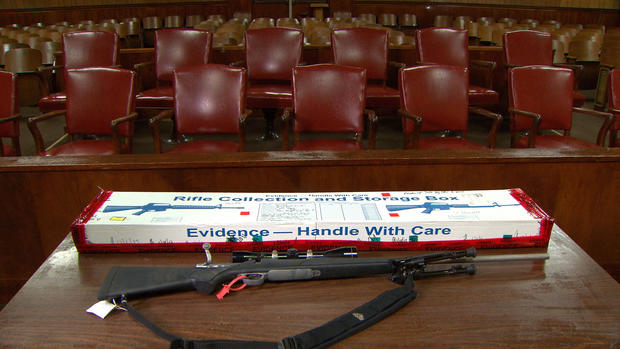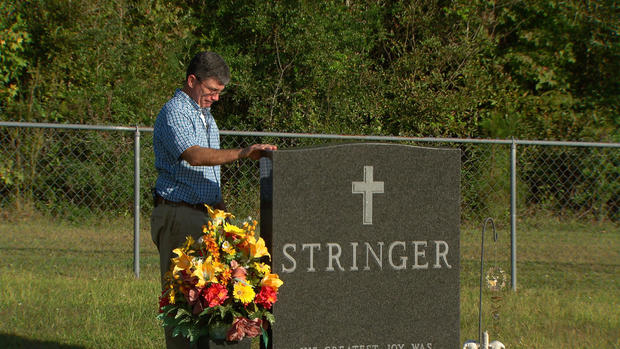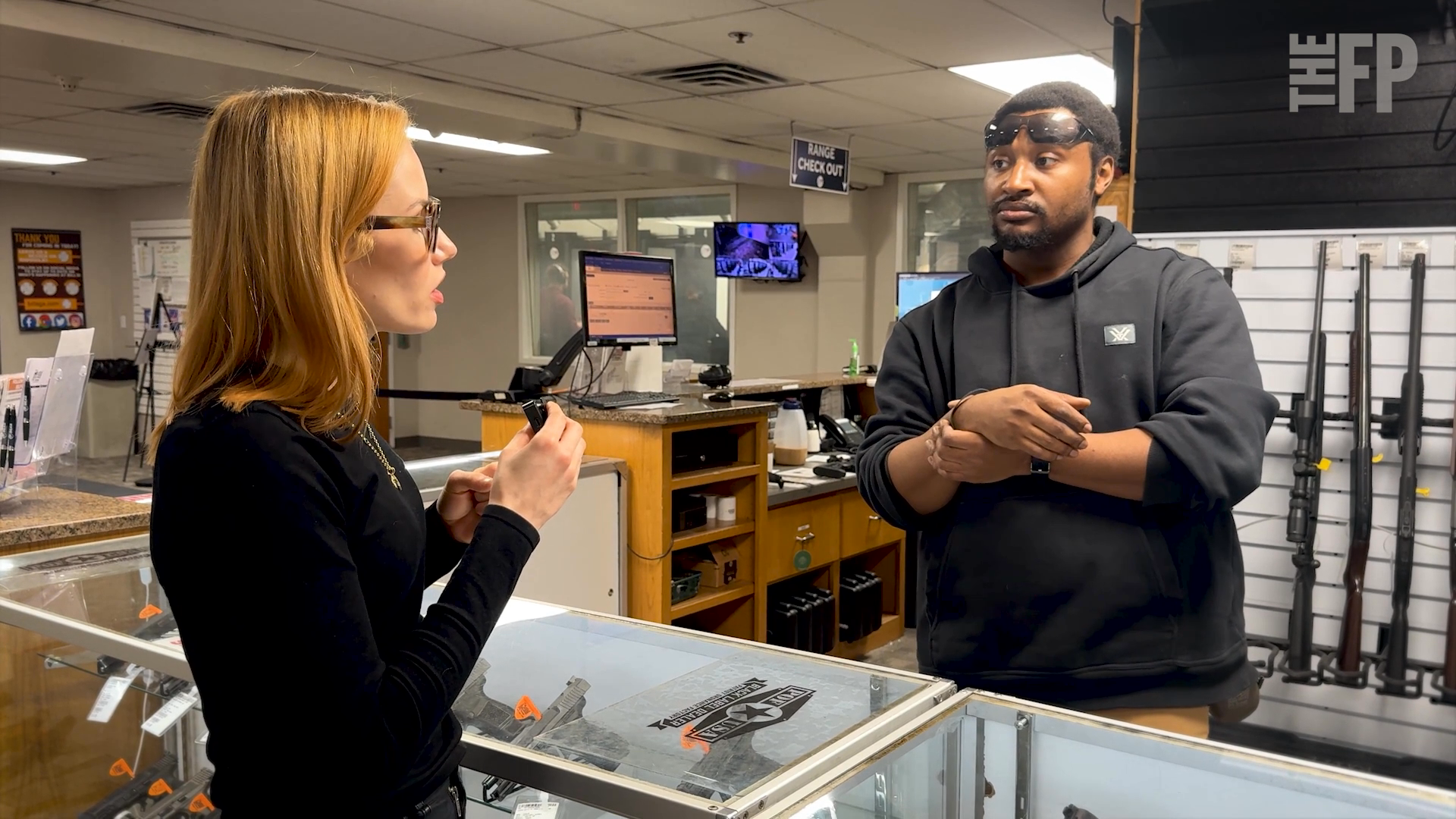Popular Remington 700 rifle linked to potentially deadly defect
The Remington 700 series is one of the most popular bolt-action rifles in American history -- with over 7.5 million sold. But there's a problem. Thousands of owners have complained that the rifle has fired without anyone squeezing the trigger.
The company has downplayed the danger for decades and the complaints represent only a fraction of the rifles out there. But as we first reported in February, one avid hunter and gun-lover is on a missiont o raise awareness about what he calls the rifle's defect. And he has good reason.
Roger Stringer: I have become so accustomed to unpleasant thoughts and hardship till that has become my new normal.
One of Roger Stringer's sons is dead; the other went to prison.
Roger Stringer: Pain is my constant companion.
Family photos of better days show dad and sons hunting. Roger, a powerline construction foreman from Enon, Mississippi, owned a Remington Model 700 rifle. And he bought another one for his older, then 12-year-old son, Zac.
"I have become so accustomed to unpleasant thoughts and hardship...that has become my new normal." Roger Stringer, father
Roger Stringer: We loved the one that I had and he was old enough and mature enough.
Lesley Stahl: And how much was the safety stressed?
Roger Stringer: Paramount.
But one night in 2011, the two boys, Zac and Justin, home alone, got into a fight. Zac, then 15, got his Remington 700.
Zac Stringer: And I loaded it. I loaded it with the purpose of scaring him.
Lesley Stahl: You knew you weren't supposed to load the gun in the house.
Zac Stringer: Yes, ma'am, I had been-- I had been taught better.
He says eventually emotions calmed down.
Zac Stringer: And I started to stand up off of the couch and when I-- when I bent at the waist and started up, I heard a click. And it went off. And I remember the fire leaping from the barrel. I remember seeing it hit. It was -- half his head was gone.
Panicking, he says, he went and got Justin's gun and placed it between his brother's legs to make it appear as though he had shot himself. Then Zac called his parents.
Roger Stringer: And Zac met me outside and he said, "Daddy, don't go in there." And I just pushed him aside and I came on in. And it was really obvious that…
Lesley Stahl: It was right here, too.
Roger Stringer: He was right there.
Detectives suspected right away that this wasn't self inflicted. Zac was arrested the day of Justin's funeral, and later confessed that it was his gun, but he insisted it went off by itself.
Zac Stringer: Well, I didn't know how it had went off.
Lesley Stahl: Did you deliberately kill your baby brother?
Zac Stringer: No, ma'am.
Lesley Stahl: Did you pull the trigger?
Zac Stringer: No, ma'am.
But Zac was convicted and sent off to prison for 10 years.
Lesley Stahl: Is it true that you actually testified against him at trial.
Roger Stringer: I did. I did. Because I'd never heard of a gun going off without a trigger being pulled. It made no sense.
What Roger didn't know was that by then Remington had gotten some 200 complaints claiming just that about rifles like Zac's, with a trigger mechanism called the X-Mark Pro. Six months after Justin was killed, another tragedy with the same trigger, this time in Chadbourn, North Carolina. 16-year-old Jasmine Thar and her cousin Jahmesha were about to go Christmas shopping.
Robert Chaffin: They were standing out in the front yard, with the grandmother sitting on the porch.
Robert Chaffin, an attorney for Jasmine's family, made this animation: a neighbor across the street in his bedroom picked up a loaded model 700. The safety was off.
Robert Chaffin: And it fired through a closed window. And in what could be the most random act you ever heard of, the bullet traveled across the street and went through Jahmesha's chest, barely missing her heart, and basically hit Jasmine almost directly in the heart, and she died in her grandmother's front yard. That's an incredibly tragic case.
In a deposition under oath, James Anthony Blackwell, a former Marine and experienced hunter, couldn't explain how his rifle went off:
Q: Do you, Anthony Blackwell, believe that you pulled the trigger?
A: No, sir.
Q: Do you think you touched it in any way?
A: No, sir.
Lesley Stahl: So, was he prosecuted?
Robert Chaffin: No.
Chaffin had already won $17 million from Remington in 1994 for a client who shot himself in the foot when he said his 700 fired on its own. Back then rifles were made with another trigger called the Walker. The company has faced 150 lawsuits alleging injury or death related to that trigger, but argues it's always human error and never the gun's fault.
Lesley Stahl: Has Remington ever admitted wrongdoing?
Robert Chaffin: Never. You cannot admit wrongdoing when you have seven million of these things on the market.
But according to a Remington internal document the company had evidence of the problem as early as 1975 when its own tests showed some of the model 700s firing without the trigger being pulled. And this 1979 document indicates the company considered a recall. That never happened, but a decade ago it did switch from the original Walker trigger to the X-Mark Pro.
Robert Chaffin: They admit under oath in recent testimony that the new model was brought about to the market because they had so many complaints with the older model, not that there was anything wrong with it. And it turns out the new model was actually worse than the old model for the first eight years they manufactured it.
Lesley Stahl: That's stunning. The X-Mark Pro came out in 2006.
Robert Chaffin: Yes ma'am.
Lesley Stahl: How soon after that did Remington start getting complaints?
Robert Chaffin: Soon.
And they kept coming: "gun fired when safety was taken off (twice)"… "trigger was not touched."… Three police departments complained. By early 2010, Remington was getting videos from customers claiming they captured the trigger going off on its own after the safety was released.
Video: "So you see the rifle did fire."
Video: "Never touched the trigger."
For years, despite the videos, and testing hundreds of rifles sent to the company, Remington typically marked complaints "could not duplicate" and filed them in a database. And regulators couldn't do anything because their hands are tied: the government is allowed to recall toy guns, but not real ones.
Robert Chaffin: In the world of firearms there is no such thing as a consumer product agency that can force any firearms makers to recall the gun. Does not exist.
Lesley Stahl: 'Cause of the Second Amendment, correct?
Robert Chaffin: Well, the right to bear arms, yes. Any recall has to be voluntary.
So the government can recall a toy gun, but not a real one. Then, in February 2014, Remington received this video.
Video: You'll notice I'm in my coat –
A Remington owner videotaped an experiment in his garage showing that the spontaneous firing is more likely in cold weather.
Video: As you can see – it fired.
With the video all over YouTube, Remington did its own tests in bitter cold: four out of 10 rifles went off. In April 2014, the company fixed the problem, and announced a recall of over 1,300,000 rifles. Yet, and here's where the critics weigh in, Remington continues to insist no one had been harmed by the X-Mark Pro defect. It says that even after settling the case over Jasmine Thar's death.
Lesley Stahl: Jasmine's family sued Remington.
Robert Chaffin: Yes, they did.
Lesley Stahl: And how much did they sue for?
Robert Chaffin: They sued for over $100 million. I cannot tell you the terms of the settlement.
Lesley Stahl: And in that settlement as all the others Remington admits no wrongdoing—
Robert Chaffin: True.
Lesley Stahl: -and gets the silence of everybody.
Robert Chaffin: True. It's a critical part of it.
Chaffin says that even when Remington offers to fix the triggers, they do too little to notify gun owners. The company declined our request for an on-camera interview but in a statement told us they "broadly promoted and advertised" the recall. Yet the last numbers shared with us indicate only about 1 in 4 rifles were fixed; nearly a million remained out there.
Lesley Stahl: Do you think there are people with this gun, with this trigger mechanism, watching us right now saying, "Whoa! I have that gun."
Robert Chaffin: This'll be the first time they ever heard of it.
And there's still the issue of the original, Walker trigger that remains in millions of rifles. Remington keeps getting complaints: nearly 2,000 in the past four years alone. It also faced a class-action lawsuit in which owners of guns with the Walker claimed the company knowingly sold them a defective product.
Remington agreed to settle, offering to replace the triggers for free, even though it "vehemently denies… there is any design defect in the Walker." A judge approved the settlement in March but Todd Hilsee, an expert on class-action notices, says the company is confusing its customers by burying the danger.
Todd Hilsee: No highlighting of "Stop using your gun; it might kill someone."
Lesley Stahl: What do they say?
Todd Hilsee: They say, "We deny there's a problem. We deny any wrongdoing."
Lesley Stahl: There's nothing wrong with this gun, but let's—
Todd Hilsee: But we're willing to fix it.
Amplifying his point, 10 attorneys general had written the judge, chastising Remington for refusing to "acknowledge responsibility for the harm caused by its defective triggers."
Lesley Stahl: If everyone turns their guns in, how much would this cost Remington to fix the problem?
Todd Hilsee: The value would be $487 million.
Lesley Stahl: Half a billion dollars.
Todd Hilsee: Half a billion dollars.
In Mississippi, Roger Stringer knew nothing about the class action lawsuit or the recall. He was visiting Zac in prison as often as he could and Zac kept telling him that he never pulled the trigger so one day in 2015, Roger picked up his iPhone:
Roger Stringer: I googled "Remington Model 700, spontaneous firing."
Lesley Stahl: And?
Roger Stringer: I just about dropped the phone when all that stuff showed up. I mean, there was just mountains and mountains of information about those guns; story after story of it happening to other people.
He called Remington and found out Zac's rifle with the X-Mark Pro was under recall. That rifle is still being held at the local courthouse. A state forensic expert did test it before the trial, but Hal Kittrell, the prosecutor in the case, says he didn't know there had been other instances of the gun going off by itself.
Lesley Stahl: If you had known about this issue with the gun, the trigger problem, would you have gone ahead with the trial, things may have gone differently?
Hal Kittrell: I say this, Lesley, I mean, had we known that there was a problem with the trigger before we were getting ready for trial, I can assure you we would've looked into that. We would've assessed this case based on that evidence, there's no question about that.
Shortly after we approached the prison to interview Zac, Roger unexpectedly got word that after five years behind bars, his son would be released for good behavior. Roger now believes his son is innocent and has filed an appeal asking the Mississippi Supreme Court to reconsider Zac's conviction. But he wants gun-lovers to know the story of his two boys, to hold Remington's feet to the fire.
Roger Stringer: What I'm pushing for is for nobody else to have to walk in my shoes. I don't want anybody else to have to see their baby in the shape Justin was in that night.
Lesley Stahl: What would you like to see Remington do now?
Roger Stringer: Eliminate the danger that is lurking in so many households.
Lesley Stahl: Some people are gonna say that it's convenient to blame Remington. In other words, what if you're wrong about Zac?
Roger Stringer: There are going to be naysayers. I accept that. I welcome another day in court. But let's do it with all the facts. I'm ready for it. Bring it on.
The legal battle over the triggers continues. In May, a hunter from Oklahoma and a sheriff's deputy from Louisiana appealed the class-action settlement, arguing it didn't do a good enough job notifying gun-owners. The case will be decided by the 8th Circuit Court of Appeals.
Produced by Shachar Bar-On. E. Alexandra Poolos, associate producer
Remington provided 60 Minutes with the following statement:








